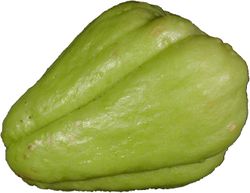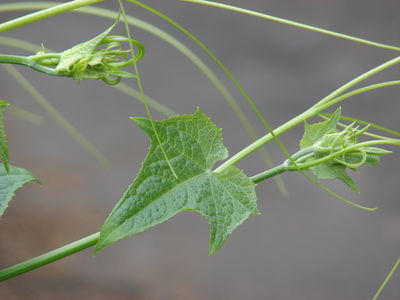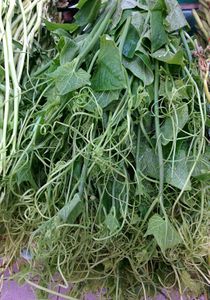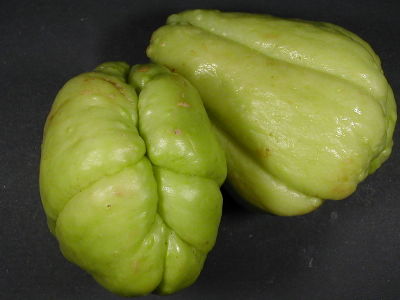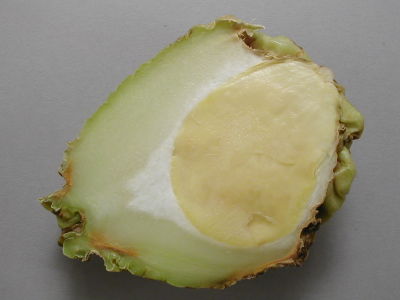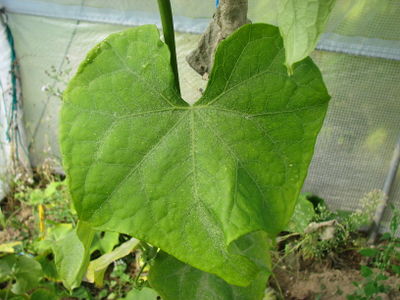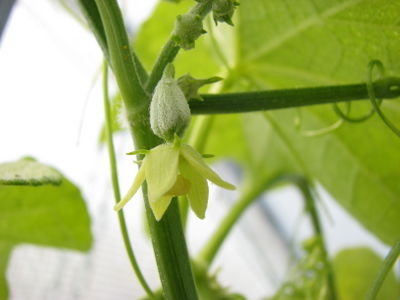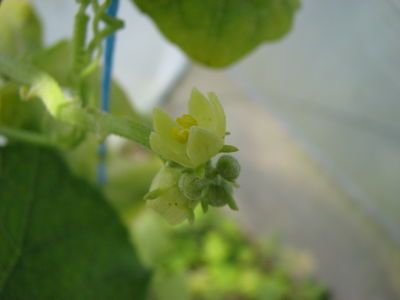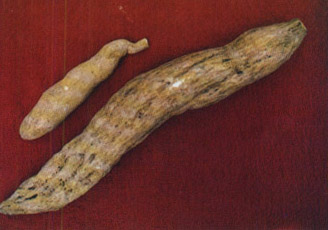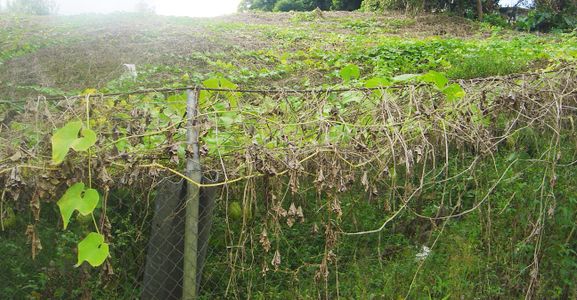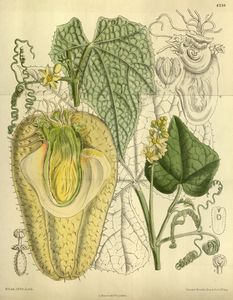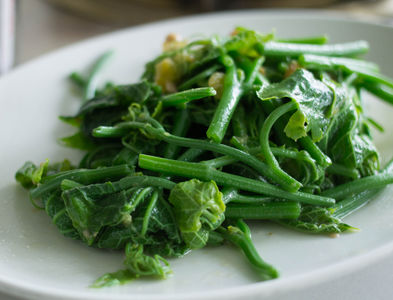Sechium edule : Différence entre versions
De PlantUse Français
| (Une révision intermédiaire par le même utilisateur non affichée) | |||
| Ligne 18 : | Ligne 18 : | ||
== Description == | == Description == | ||
<gallery mode="packed"> | <gallery mode="packed"> | ||
| + | File:Starr 070308-5476 Sechium edule.jpg|pousses | ||
| + | File:92 - yot fak mao.jpg|pousses en vente | ||
File:9042-0+032387.jpg|Fruit | File:9042-0+032387.jpg|Fruit | ||
File:9042-0+040443.jpg|Coupe | File:9042-0+040443.jpg|Coupe | ||
| Ligne 23 : | Ligne 25 : | ||
File:9042-0+0813146.jpg|Fleur femelle | File:9042-0+0813146.jpg|Fleur femelle | ||
File:9042-0+0813149.jpg|Fleur mâle | File:9042-0+0813149.jpg|Fleur mâle | ||
| + | File:Ichintal.jpg|tubercule | ||
| + | File:Sechium edule germination 1.JPG|plante germant dans le fruit | ||
| + | File:Sechium edule plantation Salazie dsc03258.jpg | ||
</gallery> | </gallery> | ||
Les fruits peuvent être d'un vert soutenu ou très clair, presque blanc, épineux ou glabre. | Les fruits peuvent être d'un vert soutenu ou très clair, presque blanc, épineux ou glabre. | ||
| Ligne 46 : | Ligne 51 : | ||
|- | |- | ||
| portugais | | portugais | ||
| − | | chu chu, xuxú, machuchú (Brésil) | + | | chu chu, xuxú, machuchú (Brésil) ; chuchú, chahiota, caiota, pepinela, chocho |
| + | |- | ||
| + | | Philippines | ||
| + | | chayote (tagalog), sayote (tagalog, bicol), hayuti (ifugao) (PROSEA) | ||
| + | |- | ||
| + | | Indonésie | ||
| + | | labu siam, waluh jepang (PROSEA) | ||
| + | |- | ||
| + | | Papouasie-Nouvelle-Guinée | ||
| + | | choko, sako (PROSEA) | ||
| + | |- | ||
| + | | Thaïlande | ||
| + | | ma-kheua-kreua, taeng-kariang (PROSEA) | ||
| + | |- | ||
| + | | Vietnam | ||
| + | | su su (PROSEA) | ||
| + | |- | ||
| + | | Laos | ||
| + | | savëëx, nooy th'ai (PROSEA) | ||
| + | |- | ||
| + | | Cambodge | ||
| + | | su-suu (PROSEA) | ||
|} | |} | ||
| Ligne 67 : | Ligne 93 : | ||
== Usages == | == Usages == | ||
| + | <gallery mode="packed"> | ||
| + | File:Stir fried chayote shoots in Taiwan.jpg|mets de pousses de chayote | ||
| + | </gallery> | ||
== Références == | == Références == | ||
| Ligne 78 : | Ligne 107 : | ||
*[http://www.biodiversitylibrary.org/search.aspx?SearchTerm=Sechium%20edule&SearchCat= BHL] | *[http://www.biodiversitylibrary.org/search.aspx?SearchTerm=Sechium%20edule&SearchCat= BHL] | ||
*[http://cucurbitophile.fr/var/9042/var.php Collection Nationale de Cucurbitacées (CCVS)] | *[http://cucurbitophile.fr/var/9042/var.php Collection Nationale de Cucurbitacées (CCVS)] | ||
| − | *[http://ecocrop.fao.org/ecocrop/srv/en/ | + | *[http://ecocrop.fao.org/ecocrop/srv/en/cropView?id=1930 FAO Ecocrop] |
| − | + | ||
| − | + | ||
*[http://www.ars-grin.gov/cgi-bin/npgs/html/tax_search.pl?Sechium%20edule GRIN] | *[http://www.ars-grin.gov/cgi-bin/npgs/html/tax_search.pl?Sechium%20edule GRIN] | ||
*[http://www.ipni.org/ipni/simplePlantNameSearch.do?find_wholeName=Sechium%20edule&output_format=normal&query_type=by_query&back_page=query_ipni.html IPNI] | *[http://www.ipni.org/ipni/simplePlantNameSearch.do?find_wholeName=Sechium%20edule&output_format=normal&query_type=by_query&back_page=query_ipni.html IPNI] | ||
*[http://mansfeld.ipk-gatersleben.de/pls/htmldb_pgrc/f?p=185:45:1329164412874601::NO::P7_BOTNAME,P7_DB_CHECKBOX1,P7_DB_CHECKBOX2,P7_DB_CHECKBOX4:Sechium%20edule,,, Mansfeld] | *[http://mansfeld.ipk-gatersleben.de/pls/htmldb_pgrc/f?p=185:45:1329164412874601::NO::P7_BOTNAME,P7_DB_CHECKBOX1,P7_DB_CHECKBOX2,P7_DB_CHECKBOX4:Sechium%20edule,,, Mansfeld] | ||
| − | |||
*[http://www.plantnames.unimelb.edu.au/Sorting/Sechium.html Multilingual Plant Name Database] | *[http://www.plantnames.unimelb.edu.au/Sorting/Sechium.html Multilingual Plant Name Database] | ||
*[http://www.hort.purdue.edu/newcrop/nexus/Sechium_edule_nex.html NewCrop Purdue] | *[http://www.hort.purdue.edu/newcrop/nexus/Sechium_edule_nex.html NewCrop Purdue] | ||
| Ligne 91 : | Ligne 117 : | ||
*[[:en:Sechium edule (PROSEA)|PROSEA sur Pl@ntUse]] | *[[:en:Sechium edule (PROSEA)|PROSEA sur Pl@ntUse]] | ||
*[[Sechium edule (PROTA)|PROTA sur Pl@ntUse]] | *[[Sechium edule (PROTA)|PROTA sur Pl@ntUse]] | ||
| − | |||
*[http://tropical.theferns.info/viewtropical.php?id=Sechium%20edule Useful Tropical Plants Database] | *[http://tropical.theferns.info/viewtropical.php?id=Sechium%20edule Useful Tropical Plants Database] | ||
*[https://fr.wikipedia.org/wiki/Sechium%20edule Wikipédia] | *[https://fr.wikipedia.org/wiki/Sechium%20edule Wikipédia] | ||
| − | |||
[[Category:Sechium]] | [[Category:Sechium]] | ||
Version actuelle en date du 26 décembre 2018 à 17:51
Sechium edule (Jacq.) Swartz
| Ordre | Cucurbitales |
|---|---|
| Famille | Cucurbitaceae |
| Genre | Sechium |
2n = 24
Origine : Mexique
sauvage ou cultivé
| Français | Chayote |
|---|---|
| Anglais | ' |
Résumé des usages
- fruit, pousses et tubercule consommés comme légumes
Sommaire
Description
Les fruits peuvent être d'un vert soutenu ou très clair, presque blanc, épineux ou glabre.
Noms populaires
| Français | chayote ; chouchou, chouchoute (La Réunion) ; christophine (Antilles) ; mirliton (Louisiane, Haïti) |
| anglais | chayote, chow chow, christophene |
| allemand | Chayote |
| néerlandais | chayote, christophine, kajot, aardpeer |
| italien | chayote |
| espagnol | chayote ; erizo (Mexique : Veracruz) ; huisquil, güisquil (Guatemala) ; chocho (Cuba) ; tayote (Saint-Domingue) ; cayota (Argentine) ; cidrayota (Colombie) |
| portugais | chu chu, xuxú, machuchú (Brésil) ; chuchú, chahiota, caiota, pepinela, chocho |
| Philippines | chayote (tagalog), sayote (tagalog, bicol), hayuti (ifugao) (PROSEA) |
| Indonésie | labu siam, waluh jepang (PROSEA) |
| Papouasie-Nouvelle-Guinée | choko, sako (PROSEA) |
| Thaïlande | ma-kheua-kreua, taeng-kariang (PROSEA) |
| Vietnam | su su (PROSEA) |
| Laos | savëëx, nooy th'ai (PROSEA) |
| Cambodge | su-suu (PROSEA) |
Classification
Sechium edule (Jacq.) Swartz (1800)
basionyme :
- Sicyos edulis Jacq. (1760)
Cultivars
Histoire
[91] Concombre Arada. Vulg. Bagage à femme. Mirliton. Cette singulière espèce offre, [92] près de l'ombilic, un prolongement arrondi que les Nègres comparent au clitoris prodigieux des femmes aradas, avec d'autant plus de raison que l'ombilic lui-même a tous les caractères extérieurs de l'anus. Ce Concombre est très-recherché comme comestible. (Descourtilz, 1827)
Usages
Références
- Chauvet, Michel, 2018. Encyclopédie des plantes alimentaires. Paris, Belin. 880 p. (p. 234)
- Lagos-Witte Sonia, 1988. Botanische Studien an der Chayote [Sechium edule (Jacq.) Sw.], eine Nutzpflanze der Tropen. Thèse Bonn, Rheinische Friedrich-Wilhelms-Universität. 172 p.
- Lira Saade, Rafael, 1996. Chayote. Sechium edule (Jacq.) Sw. Rome, IPGRI / Gatersleben, IPK. (Promoting the conservation and use of underutilized and neglected crops, 8). 58 p.
- Newstrom, L.E., 1991. Evidence for the origin of chayote, Sechium edule (Cucurbitaceae). Econ. Bot., 45 : 410-428. (noms populaires).
- Sornay, P. de, 1921. (chayote). L’Agronomie coloniale. mai : 199.
